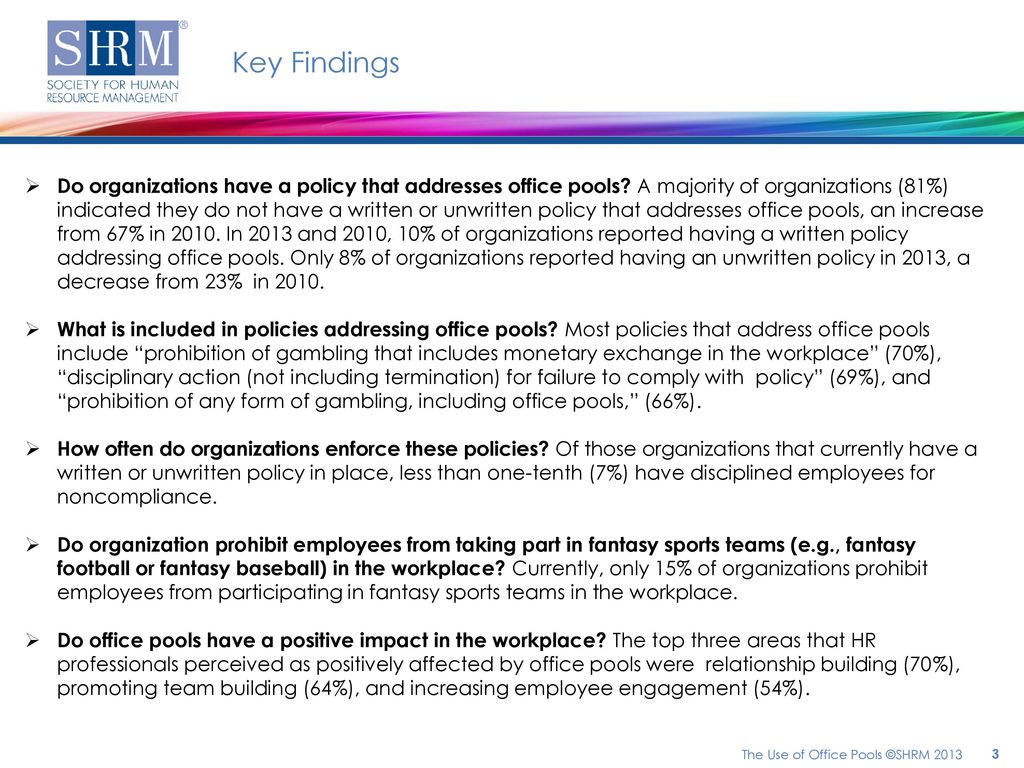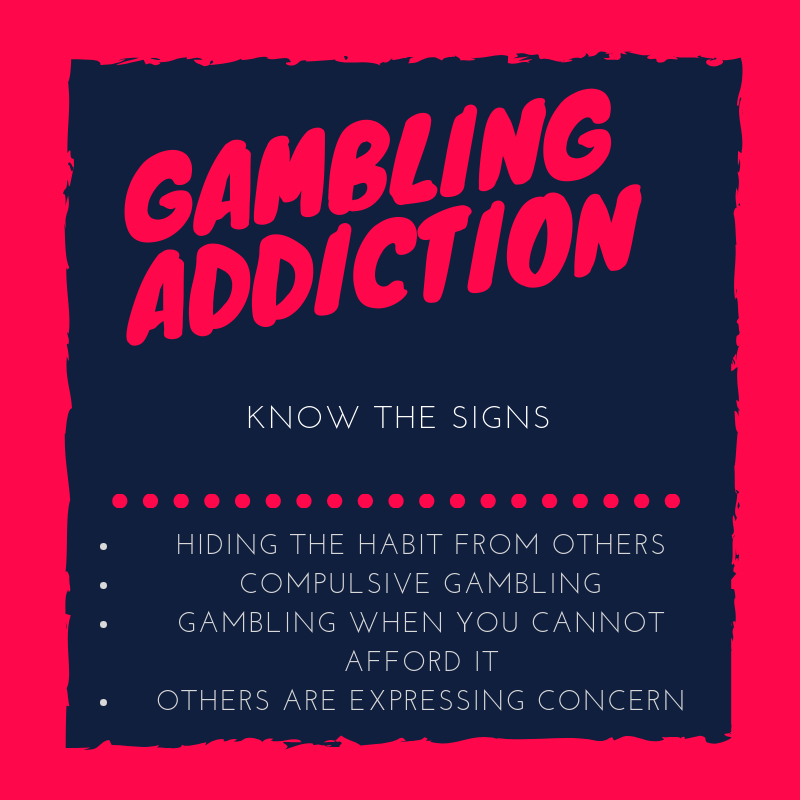Gambling Policy In The Workplace
48 per cent of workers say gambling is affecting workplace productivity
A workplace gambling policy should also recognize that employees may suffer from a gambling disorder and may need professional help. As the scientific community continues to draw parallels between alcohol/drug addictions and gambling addictions, it is inevitable that these issues will arise in employment litigation. Tackling harmful gambling is an issue that employers and trade unions can work on collaboratively and such combined efforts underpin the approach adopted by this agreement. This Workplace Charter provides a framework for action to help employers and trade unions build good practice in health and work in their organisation.


More than two-thirds (66 per cent) of callers into the Chicago-based employee assistance program Bensinger, DuPont & Associates (BDA) throughout March indicated that employees gamble in their workplace. And, nearly half (48 per cent) of the callers report gambling negatively affects workplace productivity.
“While problem gambling isn’t always the first thing that comes to mind when an employee displays problems at work, employers need to better understand the addiction and how to spot warning signs,” says Isabelle Duguay, co-ordinator of gambling services for Bensinger, Dupont & Associates.
The American Psychological Association, which classifies compulsive gambling as a mental health disorder, estimates two to four per cent of Americans have an active gambling problem. Research also shows that the incidence of problem gambling doubles with the presence of another addiction, like alcohol or substance abuse.
“Given these findings, it’s clear that if left untreated, a gambling problem can eventually turn a valuable employee into a liability,' said Duguay.
As gambling becomes increasingly acceptable in society, employers need to be aware of the following signs of problem gambling:
• Preoccupation with gambling (reliving past gambling experiences, planning the next venture or thinking of ways in which to gamble)
• Needing to gamble with increasing amounts of money in order to achieve the desired excitement
• Lying to conceal the extent of involvement with gambling
• Suggestions by others that the person might have a gambling problem
• Bragging about wins but not talking about losses
• Pay is requested in lieu of vacation time, large blocks of vacation time are not taken
• Frequently borrows money, argues with co-workers about money that is owed to them
• Complains about mounting debts
• Experiences mood swings, often related to winning and losing streaks
Taking a proactive stance will help organizations reduce the potential negative effects that problem gambling can have in the workplace. Duguay suggests the following steps:
• Create a workplace gambling policy: Only one-third of callers into BDA’s EAP reported having a policy on workplace gambling. A clear, consistently applied policy defining what activities are prohibited and permitted can go a long way toward ensuring workplace gambling does not spin out of control.
• Provide awareness training: Without awareness, problem gambling will not be detected. The signs of a gambling problem are seldom identified as gambling related. Training can help employees and employers recognize the warning signs and be prepared to offer appropriate assistance.
• Make problem gambling counseling available: Problem gambling is a serious mental health disorder that needs immediate and appropriate attention.
Latest stories
Gambling Policy In The Workplace Against


So you didn’t win the Powerball jackpot? There are still plenty of opportunities to win big in the next few weeks as Super Bowl 50, March Madness, and even the Oscars quickly approach. Many employees will likely be solicited by their fellow co-workers or supervisors to participate in office pools or football squares. However, employers should not allow conduct that is inappropriate, and in some states illegal, to interfere with business operations.
Some employers may view voluntary wagers made among employees at work as friendly competition or harmless fun. In some cases, periodic or seasonal workplace rivalries may even increase morale as different offices or different departments compete against one another for bragging rights. Working together to complete and then follow the results of a March Madness tournament bracket, for instance, may give employees who do not usually converse outside of their day-to-day job duties an opportunity to relate to each other on a different level. However, such activity could lead to division and alienation if some employees feel excluded for potentially discriminatory reasons related to race, gender, disability, religion, or other protected characteristics. Moreover, employees who already feel they are being treated unfairly may point to their exclusion from workplace wagers as further evidence of harassment, as may employees who are ridiculed by their co-workers for refusing to participate (perhaps due to their objection to gambling on religious grounds).
In addition, employees spending time during business hours to confer and place bets, as well as regularly following their picks, can lead to reduced productivity. Employees may cause interference with the company’s network operations if they stream live events on their laptops or smartphones. While the Super Bowl and the Academy Awards are held during the weekend, the March Madness tournament spans four weeks during both weekends and weekdays. Employers should be cautious not to endorse activities that will result in a significant loss of productivity.
Gambling Policy In The Workplace Organization
Bookmaking is also illegal in many states. With many employees working remotely or across state lines, the risk of unknowingly committing a crime multiplies. Likewise, the creation of on-line gambling allows employees to place bets anytime, anywhere – including from their offices or cubicles. Even though workplace gambling is unlikely to result in criminal investigation or prosecution, employers should not turn a blind eye or otherwise appear to condone any illegal conduct occurring in the workplace.

In order to help minimize potential exposure to liability, employers should make it clear what is and is not permitted in the workplace. If employers conduct business in a state in which workplace gambling is illegal, employers should notify their employees that it is expressly prohibited and that employees will be disciplined if they engage in such prohibited conduct on the job. Even if employers conduct business in a state that permits private bookmaking, employers should avoid formally sponsoring pools or wagers where money will change hands. If employers choose to allow employees to participate in non-monetary wagers, employers should remind their employees that they must comply with all company policies, including those policies related to appropriate workplace conduct and the acceptable use of company resources.
Gambling Policy In The Workplace Behavior
Employers might also want to remind their employees of the procedures available for reporting any issues or concerns that may arise related to office pools or other workplace bets, and consider training their supervisors to monitor workforce conduct during the traditional office pool/betting season to help ensure policies are being equally and consistently applied. Finally, employers are advised to watch out for situations in which employees are excluded from or pressured to participate in office pools and other wagers. While nothing is ever a safe bet, being cognizant of the issues that can arise during betting season may increase the odds of maintaining a congenial workplace.